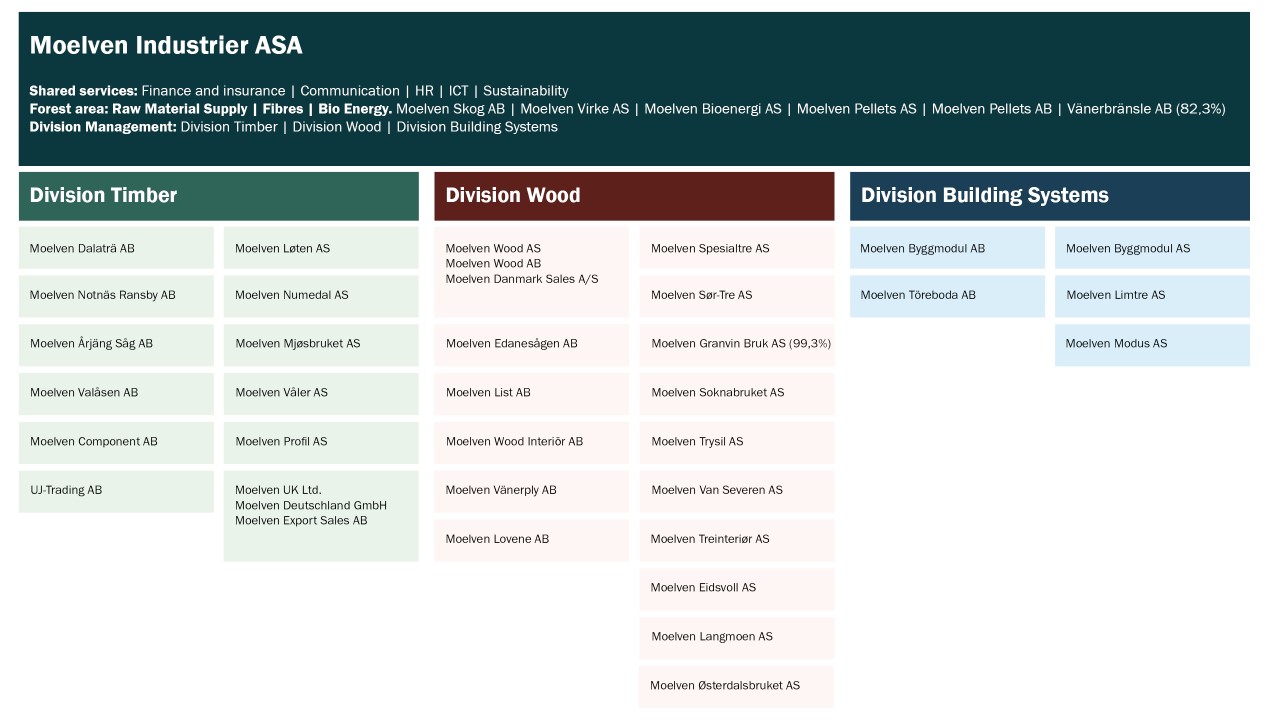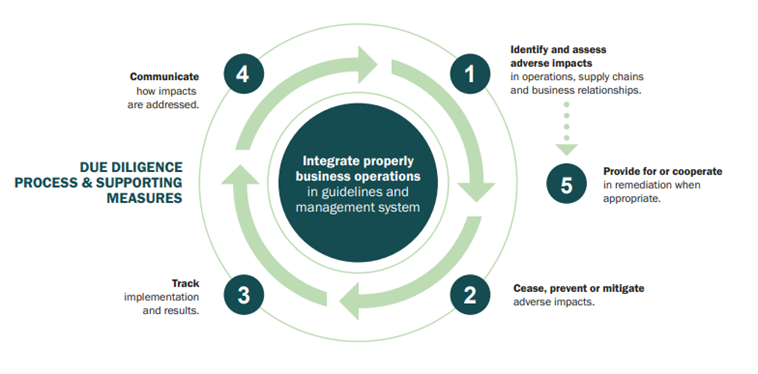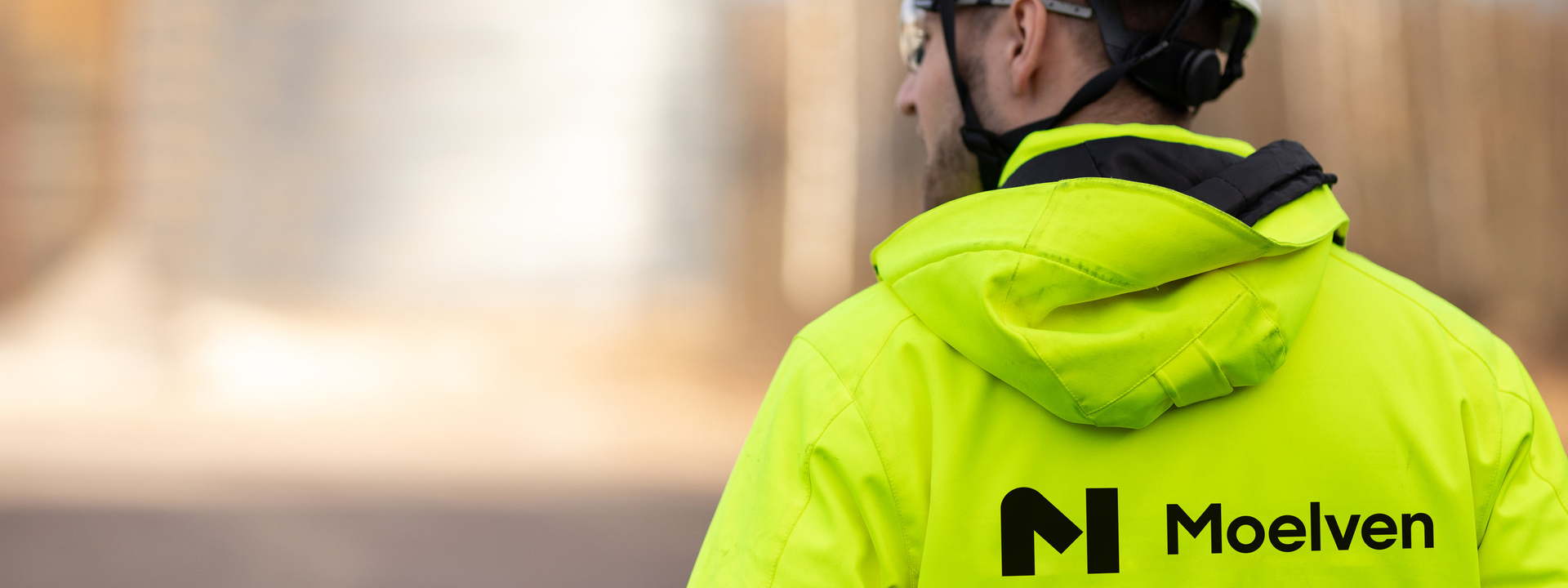Moelven Industrier ASA and the Moelven Group –Responsible Business Conduct and Supply Chain Transparency under the Transparency Act
The statement covers the period from January 1, 2024 to December 31, 2024.
The Moelven Group
Moelven Industrier ASA is the parent company of the Moelven Group, a Scandinavian group with all production units located in Scandinavia, which is also its main market. Moelven Industrier ASA has its headquarters in Moelv, Ringsaker municipality. The group comprises 34 legal entities across 40 production sites and also has sales, service, and installation offices. Moelven offers a wide range of natural products and solutions with related services for residential and holiday homes, modular buildings, interior systems, and load-bearing structures. The Scandinavian market accounts for approximately 78 percent of turnover. About 85 percent of the Group's products and services are used in new builds, renovation, remodelling, and extensions of residential and holiday homes, as well as commercial buildings. Much of the remainder business involves sales of wood pellets, chip products, and biomass for bioenergy, as well as for pulp, paper, and particleboard production. The Group also provides wood products for the furniture, interior, and packaging industries.
The Group is divided into three divisions: Timber, Wood, and Building Systems, each focusing on its respective main segments: industry, trade, and projects. Additionally, there is a reporting segment called “Other,” which includes the holding companies with shared services, raw material procurement, production and sale of wood pellets and bioenergy, as well as the sale of chip and fibre products from the Group's timber processing operations.

Moelven’s value platform, which underpins the entire company’s operations, includes a responsibility for both people and the environment. A fundamental value for us is to keep our promises and build trust through collaboration and communication with our stakeholders. The Moelven Group’s Code of Conduct, Supplier Code of Conduct, and Sustainability Policy state that Moelven will work to ensure responsible business practices by safeguarding human and labour rights, society, and the environment in its own operations and throughout the value chain. We support and respect The UN Universal Declaration of Human Rights, The OECD Guidelines for Multinational Enterprises (OECD 2011), The International Labour Organization (ILO) Declaration on Fundamental Principles and Rights at Work, including freedom of association and the right to collective bargaining. We also expect our business partners to uphold these standards and do not accept any practices within suppliers’ or customers’ operations that violate the UN Universal Declaration of Human Rights, ILO standards, or Moelven’s Code of Conduct.
More detailed information about the Moelven Group and its subsidiaries is available here.
View signed company statements here (Norwegian only).
Moelven and the Transparency Act
The Transparency Act, which came into force in Norway on 1 July 2022, promotes respect for human rights and decent working conditions. The law ensures the public’s access to information on how companies address adverse impacts on human rights and labor conditions. This supports Norway’s commitment to the UN Sus[SB1] tainable Development Goals, specifically Goal 8 (Decent Work and Economic Growth) and Goal 12 (Responsible Consumption and Production), both central to Moelven’s sustainability strategy.
Moelven follows the OECD Due Diligence Guidance for Responsible Business Conduct. Moelven’s work on responsibility and transparency in the supply chain is based on the OECD’s Due Diligence Guidance for Responsible Business Conduct. The steps of the process are illustrated in the diagram.

Integrating Responsible Business Conduct into Policies and Management Systems
Moelven’s Code of Conduct and Sustainability Policy have been approved by the Group Board and serve as the highest-level governing documents guiding all group companies’ efforts towards responsible business conduct. The Group Management has also approved Moelven’s Supplier Code of Conduct, which is based on the ethical guidelines approved by the Group Board.
A remediation routine—including follow-up to ensure that remedial actions remain effective over time—is currently being developed but was not completed as of 31 December 2024.
Work is also ongoing to evaluate and, if necessary, update the Group’s procedures to ensure that suppliers do not trade goods, components, or services in violation of applicable sanctions regulations.
The Group has central functions that either have full responsibility for procurement or act in a coordinating role across the Group. These include:
- Raw Material Supply
Timber procurement is Moelven’s largest procurement category. All timber purchases for timber-consuming units in the Timber and Wood divisions are centralised through wholly owned subsidiaries: Moelven Virke AS in Norway and Moelven Skog AB in Sweden. Certifications like FSC® Chain-of-Custody or PEFC Chain-of-Custody are key to ensuring traceability in the supply chain. All timber purchased by Moelven must be controlled according to these certification standards. -
Central Coordination Group for Transport
Transport services are Moelven’s second-largest procurement category. Moelven has established a central coordination group for transport. The group’s mandate includes establishing overall frameworks for transport operations, including health and safety procedures (HSE), the Code of Conduct, and sustainability criteria. - Group Procurement Steering Committee
Main responsibilities include group-level procurement and the establishment of group-wide procurement agreements. Using group contracts provides a stronger foundation for due diligence and support measures. Each group-level contract must have a designated contract manager, and a representative from the Steering Committee must always participate in contract negotiations. As of June 2024, the requirements for responsible business conduct and transparency (as outlined in the Supplier Code of Conduct) are part of the decision criteria for signing new contracts.
In addition to overarching policies and central functions, certain subsidiaries have their own more specific policies and procedures depending on their business area. Examples include:
- Own certifications, quality management systems, or product certifications
For wood-based products, FSC® or PEFC certifications are especially important. For more information, see here. - Certified Suppliers
Several of the Group’s suppliers hold certifications that include aspects of responsible business conduct.
Identifying and Assessing Negative Impacts in Operations, the Supply Chain, and Business Relationships
Moelven’s work on responsible business conduct in the supply chain at group level has, in addition to compliance with established guidelines and routines, mainly focused over the past year on facilitating systematic and consistent categorisation and due diligence assessments of all suppliers and business relationships.
Within Moelven’s own operations, the risk of negative impact is considered low. Moelven Industrier ASA and its subsidiaries in Norway and Sweden are subject to legislation that safeguards employee safety, the working environment, and labour rights. Moelven has established systems for structured collaboration with employee representatives through labor unions, as well as internal control procedures to monitor compliance with laws and guidelines. An annual anonymous employee survey is conducted across the entire Group, including questions about working conditions, harassment, and unwanted behaviour. The response rate in 2024 was 85%. There are processes in place to follow up on the survey findings.
To perform effective and comprehensive due diligence assessments, it has been necessary to spend time mapping existing control routines already in place across the Group’s various subsidiaries. To avoid duplicate work, Moelven’s approach is to utilize existing routines and certification schemes wherever possible, supplementing these at the group level to ensure completeness.
In connection with a major ERP system upgrade from IFS App 9 to IFS Cloud, the supplier register was reviewed and cleaned up. Inactive accounts and duplicates were removed, and master data quality assured. This process led to a reduction of over 70% in the total number of registered suppliers, significantly improving the foundation for targeted and efficient due diligence assessments and follow-up according to the Transparency Act.
In 2024, work continued on categorising the supplier portfolio by geographic location, industry sector, and type of product or service. Risk assessments of supplier categories were conducted using sources such as:
arbeidstilsynet.no, regjeringen.no, anskaffelser.no, and arbeidslivet.no.
The risk assessments and the overview of which supplier categories are not covered by existing certification schemes (where human and labour rights are addressed) served as the basis for selecting supplier categories for in-depth due diligence at the supplier level in the first half of 2024. All group- and division-level contracts were also included.
- Transport Providers
Especially relevant for exports in the Timber and Wood divisions, where foreign transport companies are often used for return haul capacity. For domestic timber transport and Scandinavian operations, Moelven uses fewer partners, many of which are affiliated through ownership, and hold relevant quality/environmental certifications, indicating lower risk. Noted risks: Challenging working conditions, high rates of sickness absence and accidents, pressure, irregular hours, and illegal employment conditions for foreign workers. - Temporary workers and contracted cleaning services
This applies to all types of temporary workers and contracted services, but is especially relevant within the Building Systems division and cleaning services in general. The risks associated with hired labour include increased vulnerability to social dumping and labor market violations, particularly in the cleaning and construction sectors where unskilled labour is common. Low startup costs for new companies, unusual employment arrangements, and the use of foreign labour with poor pay and working conditions contribute to a heightened risk of exploitation and social dumping. - Workwear
The Group purchases large volumes of workwear, protective gear, and footwear annually, much of which is produced in regions with higher supply chain risks. Within the supply chain, including the extraction of raw materials and production, there is a risk of child labour, forced labour, lack of rights to organise, and poor working conditions, especially concerning health and safety. - Group- and division-level agreements
The group has several group- and division-level agreements with suppliers. It is fundamental from Moelven's side that these suppliers are aware of and actively work to meet the standards Moelven sets for ethical and responsible business practices.
In total, these categories include 321 suppliers. In May 2024, an online survey was sent to them which, in addition to collecting basic information about the suppliers and how responsible business conduct is integrated into their policies and management systems, also requested acceptance of Moelven's Code of Conduct for suppliers. The collection of survey responses is still ongoing. The follow-up— both in terms of obtaining missing responses and analysing the received ones to identify areas requiring further assessment or action — has continued throughout the second half of 2024. As of the end of the year, no issues had been identified through the survey that warranted further action beyond collecting the outstanding responses.
Stop, prevent, or reduce negative impact
No cases of negative impact were identified in the period from 1 January 2024, to 31 December 2024. Moelven’s established whistleblowing channel is used for any complaints related to the Group’s work with the Transparency Act:
- Email: varsling@moelven.com
- Anonymous reporting: whistleblowing.moelven
Requests for information under the Transparency Act’s duty to inform:
- Email: apenhetsloven@moelven.com
Monitor implementation and results
The Group routines for due diligence assessments, as well as measures implemented, will be evaluated in 2025. Emphasis will be placed on ensuring that Group routines, combined with specific company-level routines and certification schemes, together provide a satisfactory level of due diligence. Responsibility for this work lies with the Group’s sustainability function in cooperation with Group procurement.
Results from the due diligence assessments are communicated internally to the department responsible for the relevant supplier category or supplier. Communication to external stakeholders takes place through the annual report required by the Transparency Act. Any identified cases of negative impact that violate requirements in certification schemes or similar will be communicated within the value chain to parties that are or may be affected.
Communication
Moelven’s website is the main communication channel for information about Moelven Group and its subsidiaries’ work related to the Transparency Act.
The statement prepared in accordance with the Transparency Act’s requirements for public disclosure of information by all group companies has been signed by the boards of all Norwegian Group companies covered by the Act, and can be found at: www.moelven.no/apenhetsloven.
